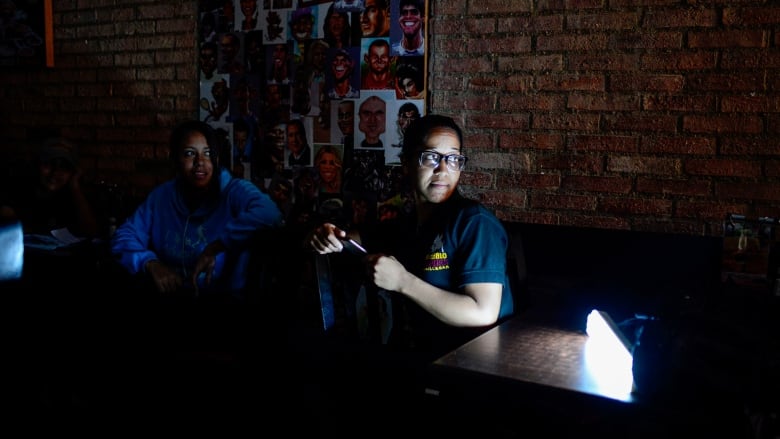Widespread power outage plunges Venezuela into darkness
Government blames outage on 'electromagnetic attack'

The lights have gone out across much of Venezuela, snarling traffic in the capital and stirring fears of a return of the blackouts that in March plunged the country into chaos.
Power in the capital went out around 4:30 p.m. local time and immediately backed up traffic as stop lights and the subway stopped working during rush hour.
"This is horrible, a disaster," Reni Blanco, a 48-year-old teacher, said as she joined a crush of people who flooded into the streets of the capital trying to make it home before nightfall.
There were reports on social media that 19 of 24 Venezuelan states were affected. NetBlocks, a group monitoring internet activity, said network data showed most of Venezuela was knocked offline, with national connectivity at just six per cent after the latest outages.
The normally non-stop state TV channel, a key source of government-supplied information, was also off the air.
Venezuelan Information Minister Jorge Rodriguez said a nationwide blackout on Monday was caused by an "electromagnetic attack" on a hydroelectric dam, although he did not provide evidence for the claim. He appealed for calm and said contingency plans had been activated so medical facilities would not be affected. Security forces were also being deployed to guarantee people's safety, he added.
Food, medicine shortages
Venezuela suffered a series of blackouts in March, the worst in decades, that left millions of people without running water and telecommunications. That exacerbated an economic crisis that has halved the size of the economy.
Hyperinflation in the oil-rich nation has led to widespread shortages in food and medicine, prompting more than four million Venezuelans to leave the country.
"It terrifies me to think we are facing a national blackout again," said Maria Luisa Rivero, a 45-year-old business owner from the city of Valencia, in the central state of Carabobo.
We Venezuelans won't grow accustomed to this.- Venezuelan Opposition leader Juan Guaido
"The first thing I did was run to freeze my food so that it does not go bad like it did like the last time in March. It costs a lot to buy food just to lose it."
More recently, as power service in the politically important capital has improved amid widespread rationing in the interior, officials have taken to downplaying the outages as similar to recent ones in Argentina and even parts of Manhattan.
Authorities attributed the almost week-long power outage in March to a U.S.-sponsored electromagnetic attack on the Guri Dam, the source of around 80 per cent of the nation's power.

But Maduro's opponents said the outage laid bare years of underinvestment in the nation's grid by corrupt officials who mismanaged an oil bonanza in the nation sitting atop the world's largest crude reserves.
"They tried to hide the tragedy by rationing supplies across the country, but their failure is evident: they destroyed the system and they don't have answers," Opposition leader Juan Guaido said on Twitter.
Guaido, who the U.S. and more than 50 other nations recognize as Venezuela's rightful leader, reiterated an earlier call for nationwide protests on Tuesday.
"We Venezuelans won't grow accustomed to this," he said.

Much of the government's focus since the March blackouts has been on repairing transmission lines near the Guri Dam, which provides most of Venezuela's electricity.
Jose Aguiar, a U.S.-based power expert who hails from Venezuela, said that alternative power plants running on diesel fuel and gas are unable to make up the difference.
He estimates that, since the March outages, the country has lost about 1,200 megawatts of thermal power, or about 40 per cent of its thermal generating capacity at the start of the year, as the government overburdens the fragile system in a desperate attempt to keep the lights on in Caracas and other cities.
"Even in the best-run grids, equipment is going to fail," Aguiar, who is an informal adviser to Guaido on electricity issues, told The Associated Press. "But when you operate on a limb, outside of safe limits, you expose yourself to these types of domino events. It's like Russian roulette."
Despite the risks of another extended collapse, some Venezuelans were taking the blackout in stride.
Cristian Sandoval, a 37-year-old owner of a motorcycle repair business, said he is more prepared for a prolonged outage, having equipped his home with a water tank and his workshop with a generator. As Venezuela's crisis deepens, the sale of electric generators is one of the few growth industries in a country ravaged by six-digit inflation and cratering public services.
"If the blackout continues we'll have another round of dessert," he chuckled while sharing a piece of chocolate cake with a friend at a cafeteria growing steadily dark as the night began to fall.
"But it's very difficult for the people," he conceded. "This creates a lot of discomfort."
With files from Reuters